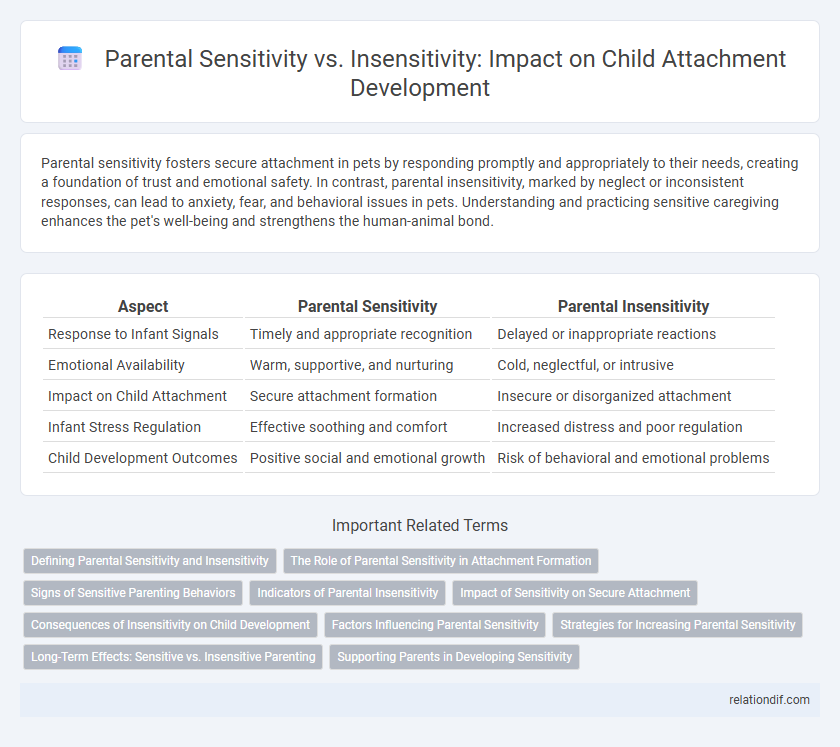Parental sensitivity fosters secure attachment in pets by responding promptly and appropriately to their needs, creating a foundation of trust and emotional safety. In contrast, parental insensitivity, marked by neglect or inconsistent responses, can lead to anxiety, fear, and behavioral issues in pets. Understanding and practicing sensitive caregiving enhances the pet's well-being and strengthens the human-animal bond.
Table of Comparison
| Aspect | Parental Sensitivity | Parental Insensitivity |
|---|---|---|
| Response to Infant Signals | Timely and appropriate recognition | Delayed or inappropriate reactions |
| Emotional Availability | Warm, supportive, and nurturing | Cold, neglectful, or intrusive |
| Impact on Child Attachment | Secure attachment formation | Insecure or disorganized attachment |
| Infant Stress Regulation | Effective soothing and comfort | Increased distress and poor regulation |
| Child Development Outcomes | Positive social and emotional growth | Risk of behavioral and emotional problems |
Defining Parental Sensitivity and Insensitivity
Parental sensitivity refers to a caregiver's ability to accurately perceive, interpret, and respond promptly and appropriately to a child's signals, fostering secure attachment and emotional regulation. In contrast, parental insensitivity involves misreading or ignoring a child's cues, leading to inconsistent or unresponsive caregiving that can contribute to insecure attachment patterns. Research links high parental sensitivity with positive developmental outcomes, while insensitivity correlates with increased risks of behavioral and emotional difficulties in children.
The Role of Parental Sensitivity in Attachment Formation
Parental sensitivity plays a crucial role in the development of secure attachment by accurately perceiving and responding to an infant's cues and needs, fostering emotional regulation and trust. In contrast, parental insensitivity, characterized by inconsistent or neglectful responses, often leads to insecure attachment patterns, increasing the risk of emotional and behavioral issues. Studies consistently show that sensitive caregiving promotes neurological and social development, reinforcing secure attachment bonds critical for long-term psychological well-being.
Signs of Sensitive Parenting Behaviors
Signs of sensitive parenting behaviors include timely and appropriate responses to a child's cues, consistent emotional availability, and the ability to soothe and comfort during distress. Such parents accurately interpret their child's needs and provide support that fosters secure attachment and emotional regulation. This sensitivity promotes healthy social and cognitive development, contrasting sharply with signs of parental insensitivity, which often involve neglect, misinterpretation, or delayed responses to a child's signals.
Indicators of Parental Insensitivity
Indicators of parental insensitivity include inconsistent emotional responses, neglect of the child's signals, and failure to provide comfort during distress. Parents may exhibit intrusive behaviors, dismiss the child's needs, or react with hostility, undermining secure attachment development. These patterns often result in increased child anxiety and difficulties in emotional regulation.
Impact of Sensitivity on Secure Attachment
Parental sensitivity, characterized by timely and appropriate responses to a child's emotional cues, significantly enhances secure attachment formation by fostering trust and emotional regulation. In contrast, parental insensitivity, marked by neglect or misinterpretation of a child's needs, often leads to insecure attachment styles, including anxious or avoidant behaviors. Research indicates that sensitive parenting strengthens the child's internal working models, promoting resilience and positive socio-emotional development throughout life.
Consequences of Insensitivity on Child Development
Parental insensitivity disrupts secure attachment formation, leading to increased risks of emotional insecurity, anxiety, and behavioral problems in children. Chronic insensitivity impairs the development of self-regulation and social competence, often resulting in difficulties with empathy and peer relationships. Research indicates that early disruptions in caregiver responsiveness correlate with long-term cognitive delays and heightened vulnerability to mental health disorders.
Factors Influencing Parental Sensitivity
Parental sensitivity is influenced by factors such as caregiver mental health, stress levels, and social support, which enhance responsiveness to an infant's cues. In contrast, parental insensitivity often arises from high stress, depression, or lack of emotional resources, impairing a caregiver's ability to respond appropriately. Environmental stability and secure attachment history also play critical roles in shaping parental sensitivity.
Strategies for Increasing Parental Sensitivity
Parental sensitivity involves recognizing and appropriately responding to a child's emotional needs, which strengthens secure attachment and fosters emotional development. Strategies for increasing parental sensitivity include active listening, observing nonverbal cues, and validating the child's feelings to build trust and emotional security. Consistent responsiveness and mindfulness in interactions promote healthier parent-child bonds and reduce the risks of attachment disorders.
Long-Term Effects: Sensitive vs. Insensitive Parenting
Parental sensitivity fosters secure attachment, promoting emotional regulation, social competence, and resilience throughout life. Insensitive parenting often leads to insecure attachment patterns, increasing risks of anxiety, depression, and difficulties in forming healthy relationships. Long-term studies link sensitive caregiving with positive cognitive development and mental health, while insensitive caregiving correlates with behavioral problems and attachment disorders.
Supporting Parents in Developing Sensitivity
Parental sensitivity, characterized by timely and appropriate responses to a child's cues, plays a crucial role in fostering secure attachment and healthy emotional development. Supporting parents in developing sensitivity involves targeted interventions such as coaching, reflective parenting programs, and video feedback techniques that enhance parental awareness and responsiveness. Research demonstrates that these support strategies significantly improve parent-child interactions and contribute to better socio-emotional outcomes for children.
Parental sensitivity vs parental insensitivity Infographic

 relationdif.com
relationdif.com